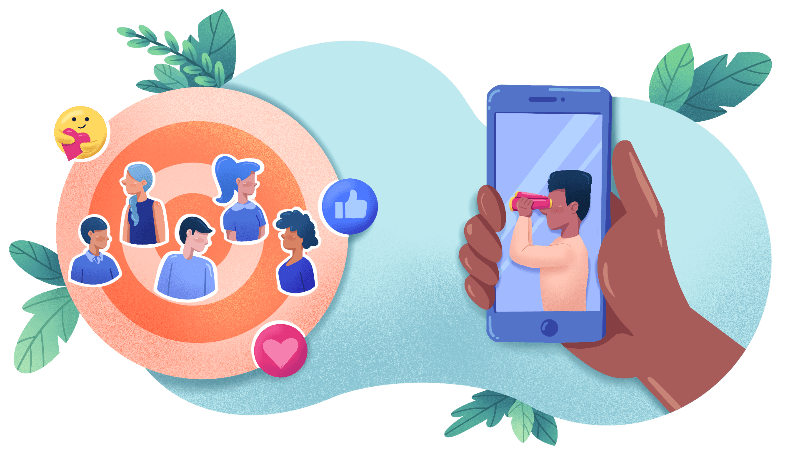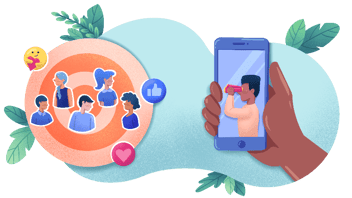Nurturing Contacts in Marketing - What are SQLs?
You've already mastered Marketing Qualified Leads (MQLs) and understand their vital role in the B2B marketing funnel, and now it's time to delve into the next crucial stage: SQLs (Sales Qualified Leads).
But what exactly distinguishes an SQL, and how do you effectively nurture these leads to convert interest into tangible opportunities and closed deals?
We unpack the definition of SQLs, exploring their significance as the bridge between marketing and sales, and providing actionable strategies to maximize their conversion potential.

What is a Sales Qualified Lead (SQL)?
Before we dive deep into the specifics of Sales Qualified Leads, it's important to recap the progression from MQLs to SQLs.
Marketing Qualified Leads (MQLs) are prospects who have expressed an interest in a company's products or services. They have interacted with digital marketing efforts, showcasing the potential for conversion, but haven't yet reached the stage where they are deemed ready for direct sales engagement. In simpler terms, MQLs are leads that marketing deems worthy of additional nurturing before handing them over to the sales team.
Now, consider SQLs – the next step in engagement and readiness for a more intimate conversation.
Now, consider SQLs – the next step in engagement and readiness for a more intimate conversation. SQLs are MQLs that have been further assessed and qualified by the sales team. This qualification is based on specific criteria, ensuring that the leads not only exhibit interest but also display attributes that make them more likely to convert into customers.
The transition from MQLs to SQLs is akin to a relay race. Marketing identifies and nurtures potential interest, and then the sales team takes over, evaluating these prospects against more stringent criteria. This collaboration ensures a smooth handoff, with both teams working together to guide leads toward the ultimate goal – conversion.
On average, 50-70% of MQLs qualify as SQLs, but it can range from 20% for complex B2B sales to 80% for simpler, transactional products.
SQLs possess key characteristics that distinguish them from MQLs. Firstly, they often demonstrate higher engagement, possibly through actions like repeated interactions with the website, engagement with content, or expressions of intent. This increased engagement signals a more advanced stage in the buyer's journey.
Secondly, SQLs align more closely with the ideal customer profile (ICP) defined by the sales team. They have attributes that make them interested and more likely to convert into paying customers. This alignment streamlines the sales process, allowing teams to focus on leads with the highest potential for conversion.
In essence, SQLs represent the point where marketing efforts naturally transition into the domain of sales. They are leads that have moved from general interest to readiness for deeper, more personalized engagement. Understanding the distinction between MQLs and SQLs is crucial for developing targeted strategies that cater to the specific needs and characteristics of leads at each stage, ultimately propelling them toward the coveted status of a deal or opportunity.
Understanding the Sales Qualified Lead Journey
Mapping the SQL Stage
1. Identifying Leads in the SQL Stage
The SQL stage represents a pivotal moment in the lead nurturing process, where prospects transition from general interest to a more advanced level of engagement. Identifying leads in the SQL stage involves meticulously evaluating their interactions and behaviors. Unlike MQLs, SQLs have moved beyond expressing interest; they showcase specific actions that signal a readiness for deeper engagement. This could include repeated website interactions, prolonged engagement with content, or specific inquiries that indicate a more advanced level of consideration.
The identification process is a collaborative effort between the marketing and sales teams. Marketing is crucial in initially nurturing leads to this stage while the sales team evaluates these prospects against predefined criteria. This partnership ensures that only the most qualified leads progress to the SQL stage, creating a more efficient and streamlined transition.
2. Characteristics and Behaviors of SQLs
Understanding the characteristics and behavior of SQLs is fundamental to tailoring effective nurturing strategies. SQLs exhibit specific traits that set them apart from earlier stages in the funnel. Firstly, they display a heightened level of engagement, indicating a genuine interest in the product or service. This engagement can manifest through actions such as downloading resources, attending webinars, or requesting personalized demos.
Moreover, SQLs often showcase a more thorough understanding of their own needs and challenges. They are actively seeking solutions and information that align with their specific pain points, making them ripe for a more targeted and personalized approach. Recognizing these characteristics allows marketers and sales teams to craft messages and interactions that resonate with the unique mindset of SQLs, fostering a deeper connection and trust.
The Transition to Deal/Opportunity
3. Clarify the Goal
At the heart of nurturing SQLs lies a clear and defined goal – the transition to the deal/opportunity stage. It's essential to clarify this goal early in the nurturing process to align marketing and sales efforts seamlessly. The nurturing process is not an end in itself but a means to guide SQLs toward becoming qualified opportunities for the sales team.
The goal is to move beyond mere interest and engagement, steering prospects toward a point where they are not just leads but potential clients. This requires a holistic understanding of the buyer's journey, pain points, and how the product or service aligns with their needs. The clarity of this goal enables both marketing and sales teams to work cohesively, focusing efforts on nurturing SQLs in a direction that maximizes the chances of converting them into deals.
4. Bridge the Gap Between SQLs and Deals
Bridging the gap between SQLs and deals is a strategic process that involves a seamless handoff from marketing to sales. Effective communication and collaboration between the two teams are paramount. Marketing teams, having nurtured the leads to the SQL stage, provide valuable insights into the prospect's journey, preferences, and interactions.
The sales team, armed with this information, can then tailor their approach to address the specific needs of SQLs, moving them closer to the deal stage. This transition involves a delicate balance of maintaining the personalized touch established in the nurturing process while introducing the more direct and solution-focused conversations characteristic of the sales phase.
Additionally, leveraging technologies such as customer relationship management (CRM) systems aids in tracking the interactions and engagement history of SQLs, ensuring a smooth and informed handoff. This collaborative approach not only enhances the efficiency of the transition but also reinforces a unified customer experience, vital for building trust and fostering long-term relationships.
Crafting Targeted Messages for SQLs
Crafting messages for Sales Qualified Leads (SQLs) is a delicate art that requires a deep understanding of their unique needs and behaviors. Unlike earlier stages in the funnel, SQLs have progressed beyond general interest; they are actively considering solutions and are on the cusp of making a decision. To effectively nurture SQLs, it's essential to tailor messages that resonate with their specific mindset and guide them seamlessly toward conversion.
Analyze the Needs and Pain Points of SQLs
The foundation of crafting targeted messages for SQLs is thoroughly analyzing their needs and pain points. SQLs are not merely seeking information but seeking solutions that address their specific challenges. This requires marketers to delve into the intricacies of the products or services offered and highlight how they directly alleviate the pain points faced by SQLs. Understanding the nuances of these pain points allows for creating messages that speak directly to the prospect's concerns, fostering a sense of relatability and trust.
Tailor Messages that Resonate
The key to effective communication with SQLs is personalization. Generic messages fall short at this stage, where prospects seek a more individualized approach. Utilize the data gathered during the nurturing process to tailor messages that reflect the prospect's interactions and preferences. Addressing SQLs by name, referencing their specific engagement history, and aligning the content with their demonstrated interests all contribute to crafting messages that resonate personally. This personalized touch captures attention and reinforces that the business understands and values the prospect as an individual.
Personalize Communication
SQLs are in a critical phase where they evaluate the product or service and the relationship with the brand. Personalized communication plays a pivotal role in establishing this relationship. Beyond addressing their pain points, messages should convey a genuine interest in their success and a commitment to providing tailored solutions. This authenticity builds trust, a cornerstone for nurturing leads into long-term, loyal customers.
Showcase Your Solutions
In crafting messages for SQLs, the focus should shift from merely presenting features to emphasizing the tangible solutions offered. Showcase case studies, success stories, or testimonials highlighting how the product or service has resolved similar challenges for other clients. This provides concrete examples of the value proposition and instills confidence in SQLs that they are on the brink of discovering a solution that has proven efficacy.
Approaches to SQL Nurturing
Nurturing Sales Qualified Leads (SQLs) demands a strategic approach beyond generic communication. As prospects transition into this advanced funnel stage, the focus shifts from creating awareness to guiding them through the decision-making process.
Explore Nurturing Strategies
SQLs require a tailored approach that acknowledges their readiness for a deeper engagement. Diversify your nurturing strategies to encompass a mix of channels and tactics. Utilize email campaigns, personalized content, webinars, and targeted social media interactions. Each channel serves a unique purpose, contributing to a comprehensive nurturing strategy that addresses SQLs at various touchpoints. By diversifying your approach, you ensure that your messages reach prospects in ways that resonate with their preferences and behaviors.
The Role of Content
Content remains a cornerstone in the nurturing process, particularly for SQLs actively seeking information to inform their decision. Develop content that aligns with the specific concerns and considerations of SQLs. Whitepapers, case studies, and in-depth articles showcasing the product or service's effectiveness can provide the necessary information to move SQLs closer to conversion. The key is to offer valuable insights that assist prospects in making informed decisions.
Collaboration Between Marketing and Sales
Effective SQL nurturing requires seamless collaboration between marketing and sales teams. While marketing plays a crucial role in identifying and nurturing SQLs, the handoff to the sales team is where the real synergy occurs. Regular communication, shared insights, and a clear understanding of each team's role in nurturing are essential. This collaboration ensures a smooth and cohesive transition from SQLs to deals, enhancing customer experience.
Personalize Interactions and Follow-up
Personalization doesn't end with the initial message. Implement personalized follow-ups based on the prospect's interactions and responses. Leverage the data gathered during the nurturing process to send targeted follow-up messages that address specific questions, concerns, or interests expressed by SQLs. This ongoing personalization reinforces that the business values the prospect's journey and is committed to providing tailored solutions.
Leverage Marketing Automation
Marketing automation tools like the HubSpot CRM can significantly enhance the efficiency of SQL nurturing. Implement automated workflows that trigger personalized messages based on prospect behavior, ensuring timely and relevant communication. Automation streamlines the nurturing process and allows for continuous engagement, even in scenarios where direct manual intervention may be challenging.
Preparing SQLs for the Next Stage: Sealing the Deal
As Sales Qualified Leads (SQLs) progress through the nurturing journey, the ultimate goal comes into focus – preparing them for the next stage, paving the way for successful deal closure.
The nurturing process has guided prospects through awareness, consideration, and evaluation. Now, it's time to solidify the relationship and move from the realm of potential to the tangible. The goal is to transform SQLs into qualified opportunities that align with the ideal customer profile.
Preparing SQLs for deal closure involves focusing on key elements that bridge the gap between interest and commitment. Firstly, it requires a clear understanding of the prospect's needs, pain points, and expectations. Secondly, effective communication remains paramount. Timely and relevant interactions that address any remaining queries or concerns are pivotal. This involves personalized follow-ups, providing additional information as needed, and positioning the product or service as the optimal solution to the prospect's challenges.
The transition from SQLs to the deal stage involves a seamless handoff from the nurturing team to the sales team. Clear communication channels and well-defined protocols ensure that valuable insights gained during nurturing are transferred seamlessly. This handoff is about passing on contact information and providing a comprehensive overview of the prospect's journey, preferences, and interactions. A collaborative approach between marketing and sales ensures that the sales team is well-equipped to pick up from where the nurturing process left off, minimizing friction in the transition.
By focusing on these aspects, businesses can maximize the conversion potential of SQLs, ushering them into the realm of opportunities and ensuring a fruitful and lasting customer relationship.
This content is also available in:
- German: Kontaktpflege im Marketing - Was sind SQLs?
- Spanish: Nutrir los contactos en marketing - ¿Qué son las SQL?
- French: Nurturing Contacts in Marketing - Qu'est-ce que les SQL ?
- Italian: Nurturing dei contatti nel marketing - Cosa sono gli SQL?
- Romanian: Nurturing Contacts in Marketing - Ce sunt SQL-urile?
- Chinese: 在营销中培养联系人--什么是 SQL?









Leave a Comment